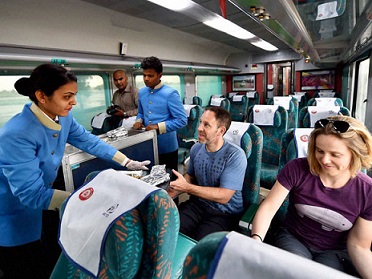Serving The Passengers:

Like the captain of a ship, THE GUARD is the incharge of a train. In the proper performance of his duties he is broadly speaking, required to make fully acquainted with topography of the section, layout and signaling at stations, working of air brake, train lights and fans, preparation of train papers and documents and use of his personal and emergency equipment to have a thorough understanding of the rules pertaining to the working of a train from station to station as given in General and Subsidiary Rules, Operating and Commercial Manuals, and other instructions and orders received from higher authorities from time to time.
- to deal with various types of accidents, mishaps and unusual occurrences on the train and during the run
- to attend to matters bearing on personal safety
- to deal with the traveling public in a helpful, courteous and competent manner.
The Guard, while working a passenger carrying train, comes in contact with a large number of people, as users of the railway’s services. They are the clients of the railways and in that position are entitled to his highest attention. In his dealings with passengers, Guard should always keep in view one important factor, In their difficulties, passengers will always come to Guard for help. Thus they will seek his assistance in matters relating to accommodation, reservation, and meals, seek information in regard to punctuality, connections, and matters of general and tourists interests; they will come to him with complaints and grievances as also for first aid and prevention of nuisance. to passengers, by and large, Guard is the visible representative of the railway administration available on the train.
This indeed is a responsible and difficult role for the guard to play. Passengers will judge the railway to a great extent from how Guard deals with their problems and difficulties, their real and imaginary grievances or in other words, how he functions as an effective public relations man.
In this role of a public relations representative of the administration, Guard, in dealing with passengers, has to
- Create a good impression
- Look after their convenience
- Attend to their comforts
- Watch for their personal safety.
The Guard, as the visible representative of the administration, has to project a good image of the railway before the passengers. This he can do by his own department and efficiency, courtesy and helpfulness; or in short, by creating a good impression about himself by means of an effective showmanship.
- Appearance and deportment of Guard count a lot in the quality of work he has to do.
- His outward appearance is very important. It is not sufficient for
- him to be all right in his work alone. He should also be smart in appearance.
To this end, a few essentials are:
- he should be in uniform with proper buttons, badges, and insignia
- his uniform should not be shabby, dirty, loose and soiled, but should be clean, ironed and well-fitting
- he should be clean by shaven or with a smartly kept beard, with-brushed teeth and hair properly combed
- he should not disregard rules of health; should keep to regular habits and take daily exercise, an appearance of good health-easy and graceful movements and correct carriage of the head and body have a pleasing effect on everybody.
In creating a good impression, there is hardly any substitute for alertness on duty. Guard should not be drowsy and inattentive or absorbed in gossip. He should not be arrogant, unhelpful and unwilling to serve.Guard is, in fact, a traveling salesman of passenger transport for the administration. Like a traveling salesman, therefore, he should develop the essential qualities of a good salesman. These are:
- Courtesy
- Helpfulness
